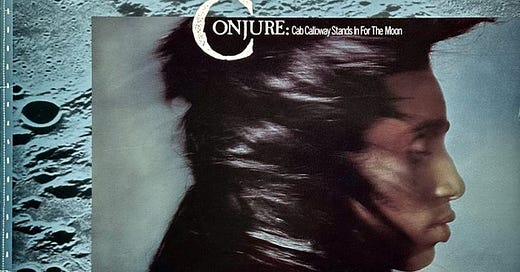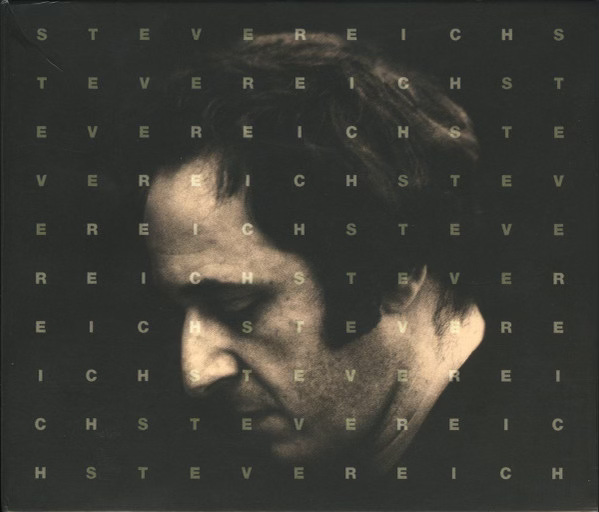The Best Band You Never Heard: Conjure
We are inside of history, and it's ravenous
Songs of Innocence and Experience
I cannot remember why I picked up this LP. It came out in 1988, and at the time I was living in Brooklyn and trying to figure out Kip Hanrahan. I had heard his Desire Develops an Edge on the radio and had a copy of Coup de Tête, and was constantly trying to negotiate the distance between myself and those albums. The music eluded my grasp in a way that made me reach farther for it, but the lyrics often left me unmoved.
There was something about the above cover that had to make me flip it over, probably seeing the name “Cab Calloway” in the title. Once I glimpsed some of the names on the back—Hanrahan as producer, and Carman Moore conducting David Murray, Steve Swallow, Don Pullen, Hamiet Bluiett, Leo Nocentelli, Allen Toussaint, et al—it was an easy choice. Who could ever put that back in the bin?
The Hanrahan albums in no way prepared me for the slow, sensual jam of the first track on the A side, “The Author Reflects on his 35th Birthday”:
Nor for what hit me as great lyrics, a song that had something rich to say in a language for anyone. And man, those sighing harmonies, that groove for the body—vertical and horizontal—that solo from Murray …
This album was my first full exposure to Ishmael Reed. I knew his name, but hadn’t yet read his poetry. While I could never completely make sense out of Hanrahan’s oblique lyrical dramas (the one exception is Days And Nights of Blue Luck Inverted, which I unreservedly love), Conjure/Reed got immediately in my soul. This was an idea of personhood and society that I could recognize and empathize with. Popular music does not have to be a mirror reflecting back at us, but experiences we can see and feel. That’s Reed, one of the great American poets. His language is vernacular, concrete, and since he’s writing from Black American experience, he’s writing about the American experience. And when you take poetry and put it together with music in the national and period style, what do you get? Well, I’m here to free your mind from received notions of style, because Conjure and Reed make Art Songs, baby.
SPECIAL NOTICE: Things are truly critical right now, so I’m making a push to get more of you to become paying subscribers. I’ve got a sweet, sweet giveaway for new annual subscriptions that come in through Labor Day (and for the subscribers who came on from May 1 through today, you will be retroactively included!):
New subscriptions will be eligible to win, by random drawing and choosing by ranked results, one of these recordings of minimalist music:
Steve Reich: Works 1965-1995
Philip Glass: The Symphonies (Nos. 1-10)
Steve Reich: WTC 9/11 (2CD set autographed by Reich)
Each of these is lightly used, discs NM/NM- in Discogs rating system (WTC 9/11 has a slight tear in the cardboard digipack)
Please subscribe, and good luck!
The Art of the Song
The problem of the art song in contemporary society is that there’s too much “art” and not enough “song.” Give me Dichterliebe every day of the week, and also give me Conjure. In 19th century Saxony, young men swooned under linden trees; in 20th century America, Ishmael Reed is “Running for the Office of Love.” The written and musical language of these albums is as sophisticated as the romantic era art song tradition, and considering the rhythmic ideas and improvisation, often more so.
I am baffled by how few people know these albums. Since I bought my first one, I have never in my life spoken with another person who even knows they exist, and I have spoken to a lot of people who would be eager to hear anything that features Murray, or Nocentelli, or Billy Bang, or even Bobby Womack, much less all together! Across three discs—Music for the Texts of Ishmael Reed which features Taj Mahal is the most rural/folk of the three, and Bad Mouth, with it’s songs about voodoo and the soul-melting pocket of “Go To Jazz”—this is Joseph Brodsky’s defense against political propaganda, in poetry and music. This is the music of humanism. And soul.
Looking back on when I first dropped the needle on “The Author Reflects on His 35th Birthday,” I know I was still immature. I wasn’t even thirty, and maturity came slowly to me, but I heard what it could be. The taste and sophistication of the musical style and words/song-making were about learning from life. It made me want to be older and wiser, it made look forward to that age for many years. I wanted to get to the point in life where I could feel that song not just in my ears and mind, but my fucking bowels and bones.
I feel it. I feel more. Music for the Texts of Ishmael Reed has two different songs from the poem “Dualism.” The first is a major key steppin’ tune that spans the transition between New Orleans dirge on the march to the cemetery, and the party music on the way back, with a beautiful, brilliant trumpet line from Olu Dara (Nas’ dad by the way). There’s only a few words:
Dualism: In Ralph Ellison’s Invisible Man
I am outside of
history. i wish
i had some peanuts, it
looks hungry there in
its cage
i am inside of
history. its
hungrier than i
thot
That’s not just a song, that’s a fucking précis on America, courtesy of Ishmael Reed and Conjure.
Good listening to all.








Jes’ grew, just like the 1890s, it’s taking the country by storm…
Mumbo jumbo, baby. Good memories.
I’d already been listening to the first Kip Hanrahan albums for a year or so when “Music For The Texts Of Ishmael Reed” came out. When I played it for a couple of close friends it really clicked with them in a way the Hanrahan albums hadn’t. I think it was a combination of the lyrics/texts and overall more funky/bluesy feel. I remember one boozy listening session where we kept playing “Dualism (1)” over and over and singing along.
The Kip Hanrahan and Conjure albums are still some of my all time favorite albums. But even more so I thank Kip for all the great musicians I first heard via American Clave.